#grand strategy
Text
New challenge for Crusader Kings, Europa Univesalis, Victoria or maybe even Hearts of Iron: rule all* of Long Finland
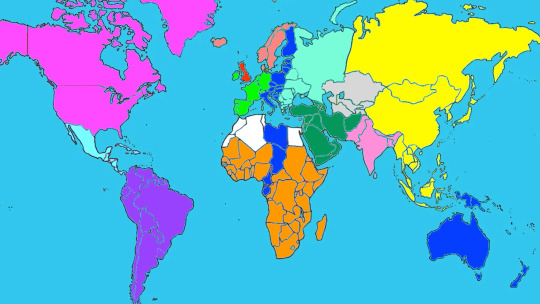
*or as much as is included in the game for CK.
114 notes
·
View notes
Text

I love that the CK3 hunt activity screen looks like me and the boys in a fortnite lobby
148 notes
·
View notes
Text
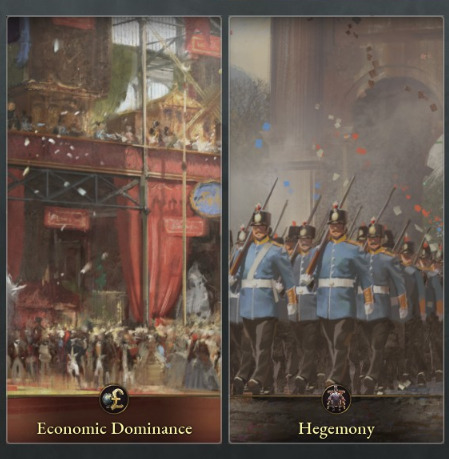
Behold, two genders
42 notes
·
View notes
Text

141 notes
·
View notes
Text
Paradox games are.. interesting. We can put it like that. I'm talking specifically about the propensity for doing truly abominable thing within the world of the game. Stellaris and it's intergalactic slavery and genocide. Hearts of Iron and how it lets you establish a fascist regime over all the world. Crusader Kings and how you can get.. well.. medieval. And Europa Universalis, where you engage in colonial expansion and genocide as a matter of course.
EU4 stands out as the most uncomfortable to play, when you sit back from the ducats and the development and the drilling.
It's not like Stellaris, where the scales are too big to ever really grasp what you're doing. There's too much abstraction. You can't look at a pop and say "this is X amount of people I've enslaved or condemned to genocide."
It's not like Hoi4, where in the interests of creating a wargaming experience, the only relevance fascism has to the game is the alliances your country makes, the type of puppet state you establish, and the buffs you get from your focus tree. TNO is as of yet the only Hoi4 experience we've had that grapples with fascism. What it means, what it does, what it is. And it's in essence a visual novel grafted onto the game, near completely divorced from the standard experience. One of the stories it tells is in fact a repudiation of the standard Hoi4 experience, that of a world conquest. What does that say about the game?
CK2, on the other hand, is very personal. The stories you tell with the game are about people, after all. Love, lust, rage, hatred. Scheming, fighting, praying. Cruelty, kindness, apathy, fervor. It does the opposite of the two games mentioned above, and brings into sharp focus the individual lives of the rulers. Every part of the mechanics and the flavor is centered around telling the tale of an individual monarch and their dynasty.
And that's an interesting question, mechanics. How do the mechanics of a game influence your experience with it? And I'm not talking about the basic functions of mechanics here or anything. I'm not talking about whether or not the game is fun to play, or well designed. I'm talking about the way the interaction of the mechanics with the setting of the game influences the way you think about it.
In Stellaris, you think about the grand scale. Of great empires, of massive economies. You're far beyond the concerns of manpower. Far beyond the focus of the individual on the ground. You have no time for that. There are stars to explore, civilizations to conquer, and a galaxy to colonize. Stellaris is a very dehumanizing game. The closest you get to stories on the ground are events talking about large societal trends, or the archaeological digs. I don't think anything with your leaders counts, really. They're paragons, isolates, and more representative of groups than they are themselves. Stellaris isn't a game about people. It's a game about civilizational machines, beyond your ability to comprehend.
In Hoi4, you think about war. Your goal is to get to a war economy and a high conscription law as fast as possible, produce as much war material as you can, and then go about the business of fighting the second world war. Hoi4 is so incredibly focused on war in its mechanics that it presents an utterly alien dichotomy the moment you sit down to think about it. You, the commander in chief of this nation of many millions of people, are actively encouraged to rush towards the death of millions. Because doing right by your country, fighting a limited war, only doing as much as is necessary to defend yourself to ensure the best life for your people, that's not only boring, it's non-optimal gameplay. This is exacerbated to such a degree that it's the opinion of most persons that the democratic nations, the most passive and reactive nations, are the most unfun to play. You are encouraged by the mechanics of the game and how it provides enjoyment to be a warmongering tyrant, because fighting war is the purpose of the thing. For a game about the second world war, it seems incredibly uninterested in actually portraying anything but the most surface level, historybro understanding of it. Particularly when it comes to atrocity. It's a game about civilizational machines, grinding into one another and desperately asking you to forget about the civilian dead.
Then EU4. It's a game that starts in 1444, and ends in 1836, and chronicles the history of the world in a wholly and entirely eurocentric manner. Your goal is not so much to conquer the world(though you may) but to become a dominant global power through your mastery of science, diplomacy, the economy, snd the military. As one might expect, one of the primary mechanics of this game is colonization. Another primary mechanic is culture and religion. Like all things in EU4, these mechanics can be somewhat labyrinthine to those who are inexperienced with the game. So I'll spare any readers an in depth dissertation on how it works. The gist of things is that each province has a religion and a culture, representing the beliefs and way of life of those living there. Ethnicity too, one might presume. When you colonize a territory, you over the course of a number of years turn it from a stateless, uncontrolled province to one with your own culture and religion. Except, the land is not uninhabited. It is with only a very few exceptions, never uninhabited. There are people there. Cultures and religions. Helpfully marked down with population stats, as well as 'aggressiveness' and 'ferocity' stats to let any potential colonizers know what to expect. As though these people are simply animals, and should be dealt with like animals.
When you colonize, of course, people will fight back. Native uprisings, they're called. So you need to station troops there, to protect your invasion and your genocide. But since your troops can only be in so many places at once, well. Wouldn't it be nice if there was some way to get the inevitable fight over with? In comes the 'attack natives' button, marked with a helpful graphic of a stylized man wearing a stylized war bonnet running from a stylized sword. With one to three applications of sword mana, you can commit genocide at your leisure, and reduce the population in the province to zero so your settlers have an easier time of things.
And so the game goes. For captured territory, there's a religion conversion button and a culture conversion button. The mechanics, through their simulation of people simply desiring to be free, make it optimal to crack down, restrict autonomy, crush rebellions, and homogenize all religion and culture. You are playing as an absolutist monarch, after all. Though even the republics aren't any better, because they're under the same mechanical pressures as the monarchies.
So it's interesting, how these mechanics influence your view of the world that the game presents. You get to see, in close to real time, how your empire snuffs out peoples and cultures and faiths, all for the sake of power and money. And these are good things for you, the player. Because the good numbers go up, and the bad numbers go down. You make more money, you have to deal with less unrest, and your name on the map grows larger. Press button, kill people, receive dopamine. All in a way that's so incredibly difficult to divorce yourself from, because the mechanics invite you to actively take part in the atrocities. And they make them fun. And satisfying. And it's on a scale that is very, very, very possible to comprehend. It's a game about civilizational machines crushing peoples under their heels, all while inviting you to look and see with just enough detail to make out the dead.
If you're going to play Paradox games, then you need to go into them knowing damn well what the difference is between what they're portraying and how they're portraying it. So you don't reduce the very real people who survived the horrors of colonialism to numbers on a screen.
#just some late night thoughts#externalizing what's been brewing for a while while we play colonialism sim#this sort of thought process always crops up when we play eu4#and I'm glad of it#perspective is important#eu4#paradox#hoi4#stellaris#ck2#grand strategy
256 notes
·
View notes
Text




211 notes
·
View notes
Text
"Welcome human, you've been sleeping for five thousand years. You'll be glad to know that humanity is still standing, science and art are thriving and everyone is happy and wealthy including you. Is there anything you'd like to do?"
"Victoria 17, NOW"
#victoria 3#victoria 17#paradox interactive#pds#pdx#grand strategy#strategy#games#video games#strategy game#strategy games
2 notes
·
View notes
Text
Played some TI4 today and won! I was Mahact (yellow), vs. Vuil'raith (orange), Nomad (purple), and Keleres [Mentak] (pink). By far our best game so far, with lots of back and forth, wheeling and dealing, and an appropriate amount of backstabbing escalating into a cautious war and each step could spell victory or doom. We were neck and neck last round but I was able to blockade orange's home and seize pink's home and secure my own victory at initiative 2 of Status phase, round 6!


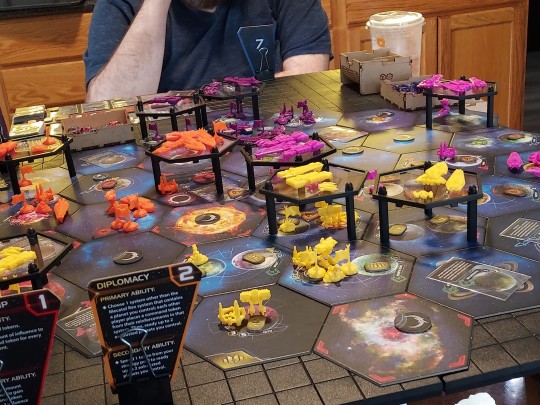
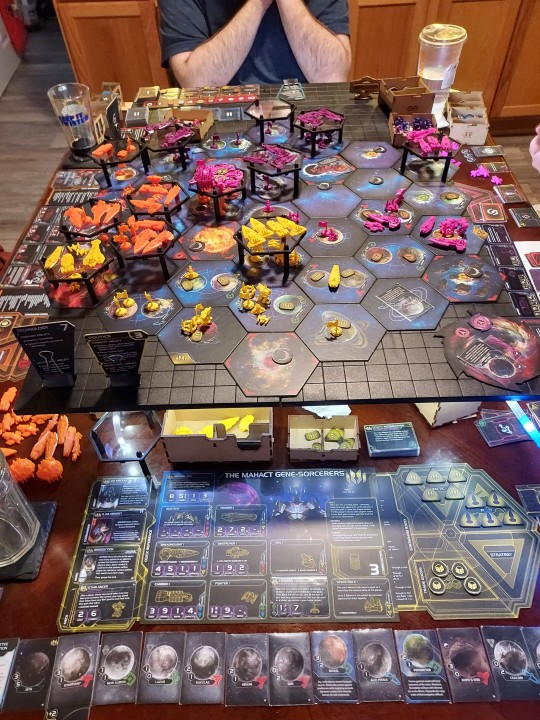



10 notes
·
View notes
Text

if i am what i play, then i am a dad. look at all of these spreadsheet games
#games#video games#year in review#steam#steam year in review#grand strategy#turn based rpg#turn based combat#turn based strategy#rpg#farming simulator#city builder#bg3#cities skylines#funny#spreadsheets
2 notes
·
View notes
Text

#hearts of iron iv#hearts of iron 4#communism#socialism#acab1312#gaslight gatekeep girlboss#paradox#grand strategy
2 notes
·
View notes
Text
Map Game
Me and my friend are making a TTRPG/board game Inspired by the Paradox Interactive grand strategies and also board games like Risk and Diplomacy. We are super excited about it and hope to publish it somewhere sometime when it is ready. The working title is "The Cartographer's Legacy" but that's subject to change. Not much has been created yet, but it's been fun working on it. Maybe soon I can release a draft of the rules.
2 notes
·
View notes
Text
Cybernetics 控制論 with Chinese Characteristics & why we suck at the real Grand Strategy Game
If you’re someone who enjoys Crusader Kings, or Hearts of Iron, you’ll know the joy of Grand strategy games. Executing economic, political and military prowess, you can rule the world... well, just a model of it. But compared to the masters, you’re trash tier. The real Grand Strategy masters didn’t play Paradox games - they played the game of life. Imagine not just having to play the game, but building the computer from scratch and the software necessary to play the games. It’s time to introduce the real Epic tier gamers:

Everyone agrees living in the West is like living life on easy mode. Norbert Wiener and Stafford Beer were two of the best known cyberneticists in the US and UK respectively during the later 20th century, but what about those in the non-Anglo speaking world? We’re looking for the most hardcore players after all.
China is the perfect example. The country was a mess after the civil war - perfect conditions for a hard-mode run. Search for articles on China in the West and you will find plenty with titles such as “The country is perfecting a vast network of digital espionage as a means of social control” and “China’s increased surveillance capacity could be dangerous”. So who, was behind the rise of these surveillance style systems in China.
The answer, in fact, is the FBI.
Note: This is a less serious version of Dylan Levi King’s article. Link at end!
Enter Qian Xuesen ( 钱学森 )

Enter Qian Xuesen. Qian was described, by most contemporaries, as a genius and a quiet but serious man who asked very precise questions. Qian had been born during the fall of the Qing dynasty in China and had been a strongly academic child. He went on to study at M.I.T on a Boxer indemnity scholarship and found himself a position in the newly founded Jet Propulsion Laboratory during World War 2.
His contemporaries, included colourful characters such as:
Frank Malina – Stellar engineer, and later the director of the Division of Scientific Research at UNESCO and creator of kinetic artworks.
Jack Parsons – A talented engineer, and later an acolyte of Aleister Crowley’s Thelemite Occultism alongside L. Ron Hubbard. Yes, the Scientology one.
Together, with others such as Sidney Weinbaum, Qian was able to assist the US achieve it’s first rocket program.
Enter FBI

After the end of World War II, it became apparent to the United States that the Soviet Union would be its greatest threat in world politics. The rise of communism in Eastern Europe led to those such as Senator John McCarthy pushing to remove “communist influence” within the United States. Working with the FBI, the entire team of the nationally sensitive Jet Propulsion Laboratory were investigated.
Many members, such as Parsons and Weinbaum had discussed communist ideals in the past which were quickly unearthed and used to push them out of their positions in the organisation. Qian, on the other hand, was someone who didn’t particularly seem to care about politics. He mostly spent his free time at home with his wife and children, and one colleague described him as having a “typical aloof oriental attitude.”. Despite this, the FBI were able to find a connection with Malina and himself.
Sensing the changing public mood, Qian decided it would be best to leave the country and set off to return to China in 1950.
This was generally considered a bad move by the FBI.
Qian had been personally involved in:
Helping to create America’s first missile program
The creation of the Toward New Horizons report for the Army Air Forces Scientific Advisory Group detailing future advances in aviation
A seat on the U.S. Air Force Scientific Advisory Board
A consultancy role on the Manhattan Project (ie. Nuclear Weapons Research)
After realising the consequences of their actions, the Immigration and Naturalization Service forced Qian into a legal purgatory for five years in fear that he would leak important matters of classified national security to the Chinese. It was in this period, however, that Qian began a deep dive into the world of cybernetics.
He wrote a book, Engineering Cybernetics, published in 1954. In it, he technically outlined a field of feedback control systems for engineering purposes, inspired by the use of automatic missile control guidance systems. In his own words:
“The celebrated physicist and mathematician A. M. Ampere coined the word cyberne~tique to mean the science of civil government (Part II of " Essai sur la philosophic des sciences/' 1845, Paris) . Ampere's grandiose scheme of political sciences has not, and perhaps never will, come to fruition. In the meantime, conflict between governments with the use of force greatly accelerated the development of another branch of science, the science of control and guidance of mechanical and electrical systems.”
Importantly, he was able to build on previous work. He made the crucial step of moving away from fully assumed knowledge to systems
“...where no exact knowledge of the properties of the controlled system is necessary for the design.”
Finally released from detention, he moved overseas to China in 1955 to begin his career.
Enter China

Qian immediately set to work. The Science Planning Commission of the State Council had just begun drafting a 12-year plan for future progress in China, and Qian was quick to give his input.
From computing, to semiconductor technology, automation to wireless control systems and more he was key to the scientific advancement of the country. He was also keen to put his ideas into action, advocating for cybernetics and systems theory to be front-and-centre in agriculture and manufacturing.
We can only speculate on what kind of Farmville player Qian would have been, but he definitely would have used a custom macro spreadsheet like some kind of freak.
It was in this time period that China began to import foreign based computing technologies which they sought to reverse engineer and replicate for themselves. Political instability, however, led to his ideas for cybernetics shelved for another decade, only to re-emerge in the 1970s. With the rise of Deng Xiaoping in the late 70s, Qian was able to take advantage of Deng’s opposition to the Gang of Four’s Maoist principles.
But what computing power would the cyberneticists use? Indigenous computers were, unfortunately, still pretty bad and the Chinese government had to use Soviet design machines and illegally acquired IBM machines which belonged to the Bank of China.
Not only were the Chinese cyberneticists eventually able to build their own rigs they stole their opponent's technology as well, like some kind of Dengist mainframe hackers.
In 1974, Qian and his team of researchers attended the Helsinki Triennial World Congress of the International Federation of Automatic Control and were astounded by the uses that Western, and Soviet, cyberneticists had been putting their computers to – namely economic planning. Inspired by Neo-Malthusian scholars at The Club of Rome, and their MIT led population overload models, Qian was instrumental in putting forward the One Child Policy.
Qian’s was also a pioneer of “legal systems engineering” – the use of cybernetics in law enforcement. The Public Security Bureau (PSB) set up Golden shield, a system which allowed law enforcement to access information on citizens tax records, personal details, criminal record and more. This is the system which has led to the current Chinese surveillance state in the 21st century.
Cybernetics vs Reality

Theory and reality don’t always mix. Qian was responsible for many policy successes, but some of his policies are responsible for a number of issues that China is experiencing today.
Take China’s One Child Policy. This is the ultimate example of theoretical idea combined with real world culture and consequences. The idea behind the policy is sound – keeping population within set limits to prevent over-burdening the country and its resources. The reality is more difficult:
The state apparatus needed the tools to enforce this policy. This wasn’t always possible, and in many rural communities many children were sent to orphanages and weren’t observable in the system of control.
Culture led to more women being aborted than men - a male child being more valued in society. This resulted in gender imbalances that still plague the country to this day.
This underlies the failings of many cybernetic systems: They cannot measure that which they can’t observe. In data-science terms, crap goes in, crap comes out. The Chinese cyberneticists were most successful where they were able to use reality to update their systems, and take into account how the bureaucratic systems functioned.
Qian, in his later years, was remote and distant. He refused to interact with anyone outside the country and eventually died in 2009.
Lessons to be learned?
So what can we learn from this?:
Persecuting people for no reason can backfire, and lead to the Chinese Nuclear Program. You would have thought people would have realised this after The Treaty of Versailles, but there we go...
Cybernetic systems are only good if they adapt to fit reality, otherwise they can make things worse. You may think that your economic strategy in HoI II is working, but if you don’t invest in your military in response to foreign force build-up then you’re fucked when they knock on the door with a blitzkrieg.
Grand Strategy Games are a great analogue for control systems - a simplified abstraction of reality. They often don’t model the difference between assumed input and what the input actually means in reality. Practical cybernetics need to take into account real world use of systems and societal/cultural/social implications.
The main fable behind this story is to do your research, and consider the real world implcations of your actions. You may be tempted to put your feet up and stick with a simplified understanding of the world - this is bad.
The blind ideology of the McCarthy & his FBI investigators, and the lack of effective monitoring system for Chinese families by Qian, both led to bad outcomes.
One bad choice by the FBI led to not only Qian helping China advance technologically, but also it’s mass surveillance system and the One Child Policy and it’s now serious effects on China’s society.
Sources (I’ve missed some out, but can provide links on request):
https://www.theatlantic.com/international/archive/2018/02/china-surveillance/552203/
https://www.washingtonpost.com/made-by-history/2023/01/10/china-surveillance-covid/
https://archive.org/details/fbi-file-tsien-hsue-shen/FBIFile_Tsien_Part1/page/n25/mode/2up
https://www.sciencedirect.com/science/article/pii/0895717788904438
https://www.palladiummag.com/2022/10/17/the-genealogy-of-chinese-cybernetics/
5 notes
·
View notes
Text
So actually while I've got you on the line, let me tell you what I particularly like about Crusader Kings above all other strategy games. Let's start with a basic zinger: In a conventional sense, Crusaders Kings is very fucking easy. This is our map.
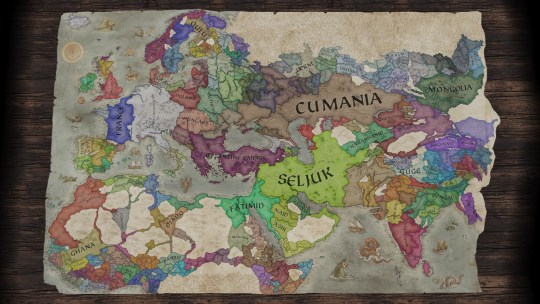
If you want to map paint, then even with only a decent understanding of the game's mechanics you can play as Ireland and say "top of the Morning" to the folks over in Pagan. I won't say this has no challenge, but in a other title, like say EU4, this would be a much harder task. That game has a lot of mechanics specifically surrounding aggressive expansion. You touch one province in the Holy Roman Empire and every European power might let you find out for free.
But you aren't playing as a Kingdom, not abstractly. This is who I started as for my first run with the new content pack:
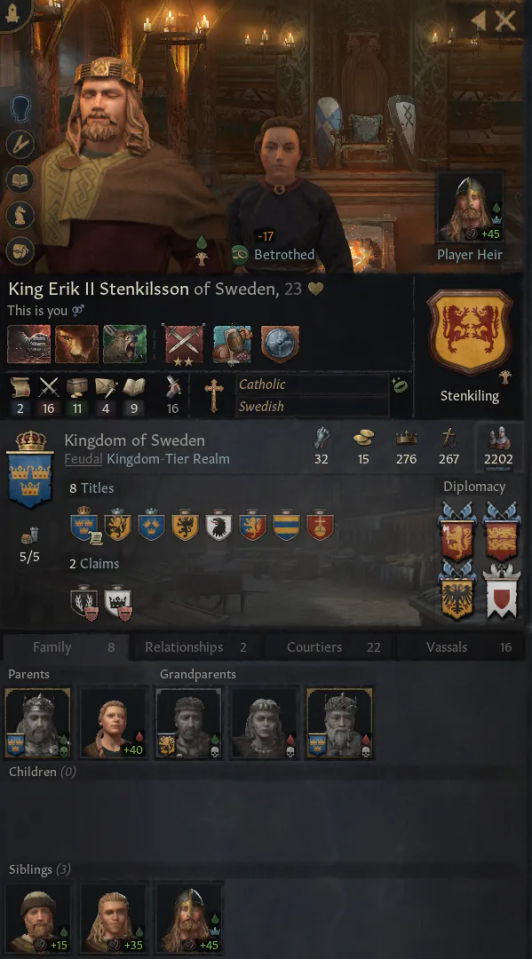
If you aren't familiar with the game, what is chiefly important to understand is that I am this guy.
He has a family. He has an age. He has personality traits. He has a religion he publicly claims to follow. He has a history as a person. He happens to be the King of Sweden, but he can lose those titles. He eventually dies and passes them on to his heirs based on the realms established succession laws. I am not playing as Sweden in the abstract, but the man who claims to rule it.
What CK3 is at it's core is a role playing game. When you accept this Immersion and bind yourself to accept this, and also accept that you must abide by in character actions (helped by the stress system), the absolute WONDER of this game (and its predecessor) opens itself up to you. This guy likes to lead his own armies (he is brave and a noted warrior and commander), this guy is stubborn to a fault and it often causes friction with vassals and foreign rulers, this guy is wrathful and the consequences of his temper are often fatal. He isn't a great father or guide to any of his children but his oldest son. His lack of consideration and legacy have left scars on many of his other children.
So my genuine reccomendation is that if you haven't played it, it is a genuinely fun role playing experience, and is one of the best examples of emergent gameplay I have ever played across both CK2 and CK3.
125 notes
·
View notes
Text
British Malaya to Malaysia in Road to 56 | HOI4 A2Z

Playing Every starting nation in Hearts of Iron IV from A to Z. Today, I will be playing as British Malaya as I achieve independence and stay democratic and assist the Allies against Japan using the Road to 56 mod.
Mods Used:
*The Road to 56: https://steamcommunity.com/sharedfiles/filedetails/?id=820260968
*6 Support Companies: https://steamcommunity.com/sharedfiles/filedetails/?id=2666603117
*Ship Designer - Universal: https://steamcommunity.com/sharedfiles/filedetails/?id=2896492648
*Toolpack without the errors: https://steamcommunity.com/sharedfiles/filedetails/?id=2913150560
#hearts of iron four#hearts of iron iv#hearts of iron 4#hearts of iron#hoi#hoi4#hoi iv#hoi4a2z#a2z#British Malaya#malaysia#gaming#grand strategy#grand strategy games#grand strategy game#gameplay#video#gaming video#gameplay video#youtube#youtube video#jonberry555
1 note
·
View note
Video
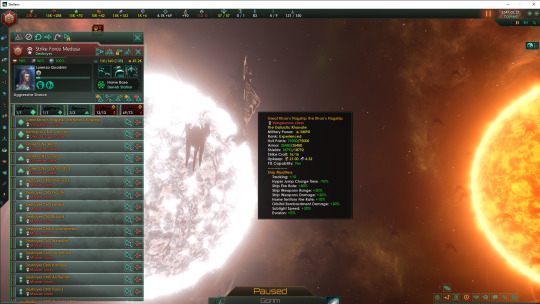



my current fleet in #Stellaris belonging to a void princess of a pirate dynasty from a destroyed homeworld



13 notes
·
View notes
Text
Dominions My Beloved

This is my attempt to share my love for the best grandest strategy game ever made with you Tumblr. Here it is in all its glory, that game your neighborhood autistic tgirl has over 2000 hours in.
Pictured above is my Pretender God

hollowed be her name, engaged in viscous combat with the nation of Bandar Log and their tiger riders.
In this game, you embody a Pretender God of your creation, a worshiped creature that seeks to defeat all other Pretenders and become the one true God or Pantokrator.
All gods worth anything have worshipers, so your Pretender heads a nation inspired by myth and legend. Everything from Zoroastrian inspired bird people, to a satanic twist on the inquisition, to Lovecraft, glamorous elf vikings, and beyond are represented here. One of the two Swedes who makes this game is a mythology professor. In my case, I chose to lord over the Ice Giants of Jotunheim. Fear my flag!




For we are protected by magic grandmas, giant werewolves, and little goblin men riding dogs! All rendered in awesome sprite work.
But back to Blatantly a Phallus, this is his description in game. Every unit, commander, and spell has some kind of description like this.

You may be wondering how an immobile statue even gets into combat with a bunch of tiger riders in an open field. The answer is teleportation magic, which when paired with a unit literally made of rocks like Phallus, creates a lot of trouble for Bandar Log. The downside is sitting in this random field preparing another teleportation ritual for a month (one turn) before she can get back to business.

Winning the fight is the easy part with a rock this hard. She just casted the "drop meteors on them" spell called Gifts From Heaven repeatedly while the tigers hopelessly wailed on her. That's what you're seeing in the first image, meteors landing "danger close" around Blatantly a Phallus. Its of note those 100+ damage numbers are extreme in Dominions. A regular human soldier is lucky to have more than 10 hit points! But that's because this is a war game. Dominions isn't about regular soldiers. Its about destroying each other with dubious magics! Remember those magic grandmas? Well I wasn't kidding. They're necromancer blood mages, and illusionists, who can turn your insides into outsides while they make you believe your teeth have been replaced with caterpillars.
It's a beautiful game, Dominions. This is its 6th iteration, and the same two people have been working on it since 2001. It oozes passion and history in a way I've not seen another game do. All 24 years of Dominions existence it has focused almost entirely on deepening its systems. More magic, more nations, more Pretenders, more choices for the player. It's so huge it can be incredibly daunting to new players. If this sounds like fun, don't let that deter you! There are games for all skill levels.
All of these images are from multiplayer btw. Dropping a statue with a shit eating grin called "Blatantly Not a Phallus" onto your enemy is a lot more fun when its another human being. The community is robust and very friendly.
1 note
·
View note